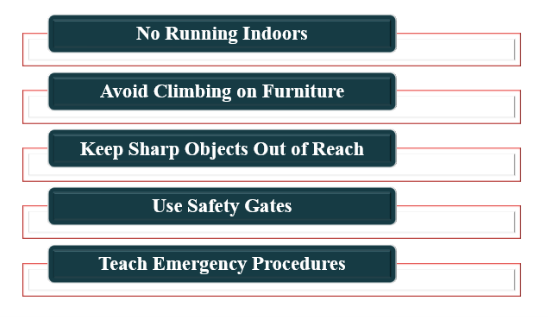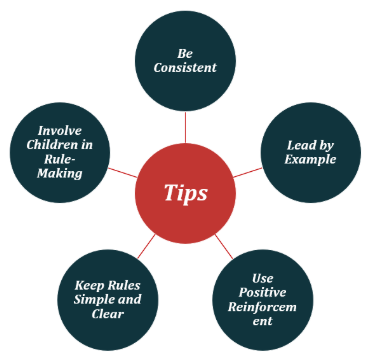Creating a loving and safe home environment starts with clear and simple rules. These rules help children understand what is expected of them, and they grow into respectful, responsible individuals. Parents can encourage positive behavior in their children by setting consistent family rules.
Why House Rules Matter
House rules help everyone in the home live together happily and peacefully. Children learn about respect, boundaries and safety. If everyone in the household understands and adheres to these rules, a supportive and peaceful environment is created where children can thrive.
Read more: What is the importance of value education?
Essential House Rules for Kids
Here are some basic rules for kids at home that will promote safety, respect and responsibility:
- Show Kindness and Respect
It is important to teach children how to respect and love everyone. A happy family is created by saying “please,” “thanks,” and “sorry.” Listening to parents, siblings, and friends patiently also teaches empathy and understanding.
- Keep Your Things Clean
Teaching kids to clean up after themselves. This instills responsibility, and keeps the home neat. Toys, books or clothes can all be put back in the right place. This teaches kids organization and pride in their surroundings.
- Speak Thoughtfully
Words are powerful. Encourage your children to always use thoughtful and kind words. Gentle and polite speech builds relationships with friends and family, and avoids misunderstandings or hurt feelings.
- Learn to Do Things on Your Own
It is important to encourage independence in children. Children should be encouraged to do small tasks on their own, such as getting dressed, packing a school bag or doing light chores. This helps to build confidence and a sense of achievement.
- Don’t Waste Things
Children can learn to value resources by refusing to waste. Encourage children to save food, water and electricity. Simple habits, such as turning off the lights and finishing your meal can make a big difference.
- Share and Take Turns
Sharing toys, books, or other items and taking turns is essential for learning cooperation. It helps children develop patience, fairness, and understanding, which are valuable life skills.
- Respect Personal Space
Always knock before entering someone’s room or personal space. This will teach children to respect boundaries, privacy, and make everyone feel valued.
- Use Screens Wisely
The amount of time spent in front of the screen should be limited. Children should be taught how to balance screen time with other activities such as reading, outdoor play and creative hobbies.
- Balance Play and Study
Children should be taught to prioritize learning over play, even though it is essential for their physical and emotional development. Encourage the rule: play is always followed by studies. It teaches responsibility and time management from an early age.
- No Hitting or Hurting Others
The use of bullying, teasing or name-calling is never acceptable. Children must learn to respect others’ feelings. Empathy, kindness and non-violence are key to creating a safe and happy home.
Safety Rules at Home
By implementing specific safety rules at home, children will understand the hazards and how to avoid them:

- No Running Indoors: Running inside can lead to falls and injuries. Encourage walking for safety.
- Avoid Climbing on Furniture: Climbing may cause furniture to tip over. Playing on the floor is a safe place for children.
- Keep Sharp Objects Out of Reach: Store knives and other sharp items safely to avoid accidents.
- Use Safety Gates: Install safety gates on stairways and in other areas where there are potential hazards to protect young kids.
- Teach Emergency Procedures: Make sure your children are aware of what to do in an emergency situation, such as a fire drill or a medical emergency.
Tips for Implementing House Rules
Setting family rules at home is only the first step. To ensure that these rules are followed, consistency and positive reinforcement is key:

- Be Consistent: Apply rules consistently to help children learn expectations and consequences.
- Lead by Example: Children often mimic adult behaviors. Show them the values and behaviors that you want to see.
- Use Positive Reinforcement: Reward and praise good behavior in order to encourage it.
- Keep Rules Simple and Clear: Make sure that children can easily understand and remember the rules.
- Involve Children in Rule-Making: Allowing them to be involved in the creation of rules will increase their sense of responsibility.
Conclusion
It is important to establish simple, clear house rules for the home in order to create a nurturing and safe environment for your children. These rules promote respect and safety, but they also help children become responsible adults. Parents can help their children develop positive behaviors and a harmonious home life by setting and enforcing family rules at home.
FAQs
Q1: How can I make house rules fun for my child?
Use pictures, charts, or posters to show the rules. Kids remember pictures better, and it makes the rules easier to follow.
Q2: Can house rules change as my child grows?
Yes! As your child grows, they can understand more and do more. Change the rules to match their age and skills.
Q3: Why are house rules important for children?
House rules help kids know what is expected of them. They make the home peaceful and happy.




